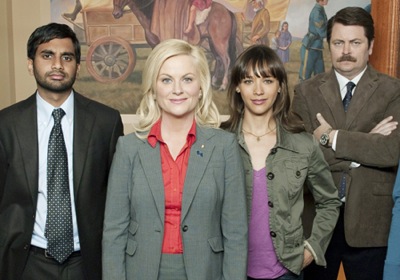By Elena Gambino
NBC’s Parks and Recreation stars SNL heavyweight Amy Poehler, formerly best-known as a one-legged dating show contestant, a fantastically beleaguered Hillary Clinton to Tina Fey’s infamous Sarah Palin, and co-anchor on SNL’s Weekend Update, again with then-head writer Fey. It’s the latter who has recently used her public popularity to write and speak extensively on the hardships that await funny women – boy’s clubs, endless debates on the nuances (or lack thereof) of fart humor, the legendary “hot or funny” conundrum – apparently in an effort to remind us that the playing field for men and women is still not even, especially when it comes to the workplace. From a series of New Yorker articles published in advance of her new book BossyPants to her touchingly hilarious acceptance speech at the Mark Twain Award ceremony last fall, Fey has helped us to remember anew that women can be funny – but more importantly, that they can be human: idealistic, assertive, and, just as often, hapless.
But as bloggers and journalists have increasingly noted, Tina Fey’s feminism can be complicated, if only for the fact that it’s been branded as THE feminism of contemporary pop culture. As blogger Sady Doyle wrote on TigerBeatdown last year, 30 Rock’s Liz Lemon has unintentionally reinforced some of the most contested ideas of the contemporary woman: that she must choose between work and, well, life; that being smart and successful is often accompanied by off-putting, man-repellent behavior; and that being the boss is something so unnatural to a woman that she must nearly kill herself working to acquire those male traits that make an effective leader. These issues are by no means the indicators of a failed comedy; but when it seems that it’s being touted as some sort of liberal woman’s manifesto, it leaves a lot to be desired. Where television used to offer Lucille Ball, Mary Tyler Moore, Bea Arthur, and even the Golden Girls to promote the multidimensionality of pop feminism, today’s programming is looking more and more like Tina Fey vs. the attack of vapid reality stars.
But amidst the frenzy of Tina Fey fandom, and, in fact, on NBC’s Thursday night prime time spot just before Fey’s 30 Rock, is another, subtler promoter of women’s place in comedy and in the workplace. Parks and Recreation features Poehler as Leslie Knope, the Deputy Director of the Parks Department in Pawnee, Indiana, a mid-level local bureaucrat with a dream. Leslie is confronted at a public forum concerning an abandoned pit in the center of Pawnee in the pilot episode by Ann Perkins, a citizen played by Rashida Jones. The pit, which was created by a developer intending to build a luxury condo complex, was abandoned when the recession hit and the company went bankrupt. In a moment of inspiration and public pressure, Leslie vows to turn the land into a public park, whatever the cost.
It’s a handy metaphor for the show’s quiet assertion that our public life – indeed, our democracy at large – is poised at the brink of a dangerous precipice. Confronted on one hand by the pit, a very real, and very ugly representation of corporate abandonment in America’s small town culture, and limited on the other by the challenges and shortcomings of a Parks Department with few resources, Poehler’s Knope gives us an honest and optimistic look at what it means to participate in democracy, and, more than that, how idealism and feminism fit in.
While 30 Rock shies away from confronting real-life issues with little more than an obliquely ironic nod, and The Office (of which Parks and Rec has oft, and unfairly, been criticized for being derivative) tends toward the awkwardly poignant rather than the socially observant, Parks and Recreation introduces us to Leslie Knope openly caring about public issues, seated in her office with framed photographs of Hilary Clinton and Madeleine Albright looking approvingly on. “Government isn’t an old boys’ club anymore,” Knope tells the camera (the show is shot as a mockumentary, a la The Office), “There’s lots of room for women now: Hilary Clinton, Sarah Palin… me… Nancy Pelosi.” Despite this paltry list, Knope seems completely sincere in her belief that women – and more astonishingly, in today’s political climate, government – can be both an indicator of and a vehicle for positive change. Knope’s greatest ambition, we soon learn, is to become the first woman president – but first, to learn from the greats, local and historic, to be a role model, and to genuinely improve her town.
Yet, though it’s a show about political values and public awareness, it’s able to tackle this conversation through the lens of comedic self-regulation. Leslie’s acute sense of right and wrong and her almost farcical belief in civic responsibility are often at the heart of the show’s jokes, which prevents her belief in public sincerity from becoming too ideological or flat-out partisan. Unlike political punditry or shows which attempt to produce an overarching moral blueprint (think West Wing), Parks and Recreation draws its conversational legitimacy from its apparent sense of the innate, and sometimes absurd, tensions in the very idea of public life. What Parks and Recreation offers is an irony whose mission neither to undermine public sincerity, nor to rebuild it from within a particular framework; rather, it seeks to draw attention to the fact that sincerity itself is often a more complicated – and much funnier – issue than we’d like to admit.
The first season, written as a mid-season replacement with only 7 episodes, falls into some classic “Liz Lemon” traps. Knope is first portrayed as hapless in love, inept in public, and idealistic to the point of childish naiveté. But above all – certainly above any individual character traits and above, even, the “woman question” – is the show’s central purpose: the recognition of public awareness and personal ambition within a political system that is rapidly deteriorating to its lowest common denominator (in Season 3, much of the material surrounds tensions between two state consultants hired to solve Pawnee’s debt crisis and the departments scrambling to keep their funding). As anyone who has ever watched ten minutes of C-SPAN could guess, the potential for comedic irony is endless.
Indeed, Leslie Knope works alongside a cast of unlikely governmental characters – Ron Swanson, the militantly Midwestern libertarian Parks Director who claims in the pilot episode that he wishes the government could be privatized, ideally following the business model of Chuck-E-Cheese; Tom Haverford, a wannabe womanizer whose greatest ambition is to become a club-promoting, cologne-designing mogul; and April Ludgate, the disaffected college intern later hired by Ron as an assistant, her only duty being to act as a “moat” between Ron “and the disgruntled masses” of Pawnee. Yet as the show rolls into Season 2, it’s increasingly clear that the set of characters is not only loveable and endlessly funny (as all unappealing characters in comedies end up being) but it also represents a group of people who, despite their differences in opinion, are able to reconcile in the name of the greater good. In short, it’s precisely what we’d like our government to be.
At the heart of this tenderly ideal little world is Leslie Knope, who, we learn, tirelessly works to achieve a sense of community, loves every aspect of the democratic process (at a public forum in Season 1, she says “These people care a lot about their community. When they yell at me, I hear it as people caring loudly at me”), and is eternally optimistic even in the face of endless bureaucratic red tape. When she’s a proponent of women’s issues, it’s because she believes – rightfully – that women’s issues coincide with the greater issues of community and democracy, rather than as a separate sphere in which female empowerment is, as it tends to feel in 30 Rock, every woman for herself.
There is certainly a place for Parks and Recreation in the world of educated, progressive comedy; it’s a welcome addition to the dialogue about women and the role of community in mass entertainment.
This post may contain affiliate links.









